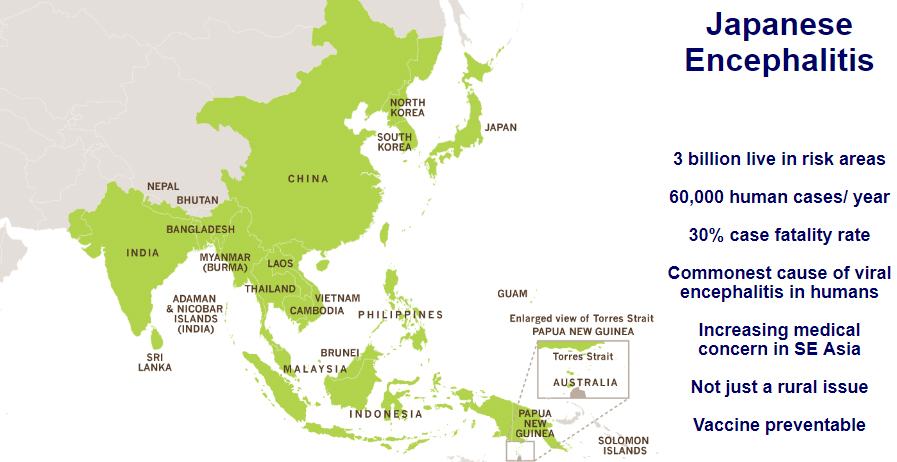
Worldwide distribution of Japanese Encephalitis, 2017
Japanese encephalitis can be a serious illness causing inflammation of the brain.You should consider being immunised against Japanese encephalitis before you travel to certain countries in Southeast Asia and the Far East.
Check with your practice nurse at least 6-8 weeks before you travel to see if you should have this immunisation.
What is Japanese encephalitis?
Japanese encephalitis is caused by a virus. It is passed to humans by the bite of infected mosquitoes. It cannot be transmitted by other humans.
Japanese encephalitis is usually a mild illness. In many cases, there are no symptoms.
However, in a small number of cases (about 1 in 200 infected people) the illness is much more serious.
In these people, the infection may start with fever, tiredness, headache, vomiting, and sometimes confusion and agitation. This may progress to encephalitis (inflammation of the brain). This can cause permanent brain damage and is fatal in some cases.
Japanese encephalitis occurs throughout Southeast Asia and the Far East. It is mainly a problem in rural farming areas. It occurs more commonly in the rainy season (roughly May-October/November) when the mosquitoes are most active.
Who should be immunised against Japanese encephalitis?
Your doctor or practice nurse can advise if you should have this immunisation for your travel destination.
Generally, it is advised for travellers who stay for a month or longer during the transmission season in rural areas of certain countries in South-East Asia and the Far East, however, there is emerging evidence that the risk may actually be (at least) equal in urban areas. In some parts of Asia such as the Philippines, the transmission season is all year long.
It may be advised for shorter trips to these countries if you are at particularly high risk. For example, if you travel to areas where rice and pig farming co-exist or if you do a lot of outdoor activities.
The vaccine is also recommended for laboratory workers who may be exposed to the virus with their work.
The vaccine schedule
The vaccine stimulates your body to make antibodies against the virus. These antibodies protect you from illness should you become infected with this virus.
This is the only licenced Japanese encephalitis vaccine in the UK. It is an inactivated (dead) vaccine and is therefore very well tolerated.
It is indicated for active immunisation against Japanese encephalitis in adults, adolescents, children and infants aged 2 months and older.
It should be considered for use in individuals at risk of exposure through travel or in the course of their occupation.
The standard schedule is two doses given 28 days apart. An accelerated schedule can be given to adults (over the age of 18 years) 7 days apart.
A booster dose should then be given within the second year after the initial course of two injections. This will then provide cover for a further 10 years.
Who should not receive the Japanese encephalitis vaccine?
If you are ill with a fever you should postpone the injection until you are better.
You should not have an injection of this vaccine if you have had an allergic reaction to a previous dose of this vaccine.
If you are pregnant or breastfeeding, it is usually only given if the risk of Japanese encephalitis is very high and cannot be avoided.
Are there any possible side-effects from the vaccine?
As with all vaccines. mild pain and redness occur at the site of injection in some people. This can be eased with over the counter painkillers.
The most common side-effects after receiving the vaccine is a headache and muscle aches. Other less common reactions with this vaccine include a flu-like illness, fever and fatigue.
Overall the vaccine is very well tolerated.
